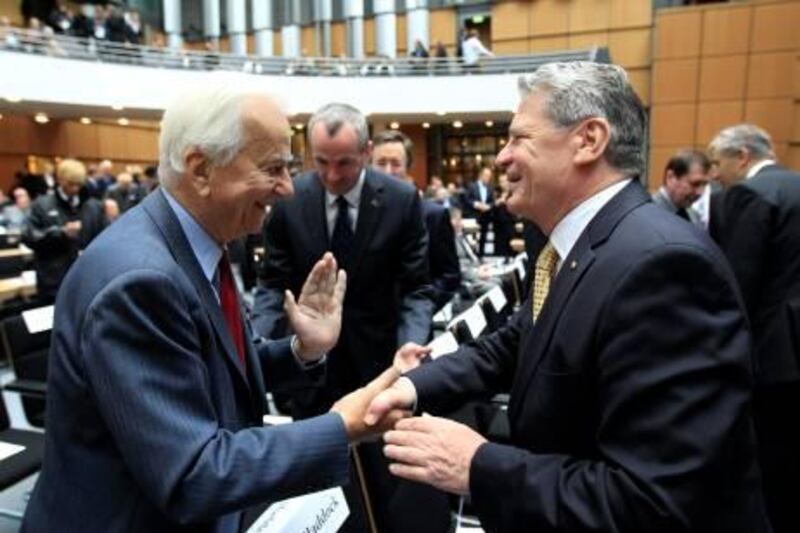BERLIN // Germany's leaders will celebrate the 20th anniversary of the country's reunification today by hailing the integration of the former communist east as a unique success story, but many easterners still feel they have lost out, and the region remains plagued by huge economic and social problems. Chancellor Angela Merkel, who grew up in the east, will attend the main ceremony in the northern city of Bremen. The event will commemorate the signing of the treaty that dissolved the eastern German Democratic Republic (GDR) and united the nation under the West German constitution.
"All in all, I'd say the results of 20 years of unification have been for the most part positive," she said in a magazine interview. Her interior minister, Thomas de Maizière, told a news conference last month that the east's standard of living was a "little economic miracle". "Reunited Germany has achieved great things," he said. But many eastern politicians have a less rosy picture, reflecting a persistent and deep sense of resentment among many in the former GDR who feel the terms of unification were imposed on them after the fall of the Berlin Wall in 1989, and that they have been treated like second-class citizens ever since.
Iris Gleicke, an eastern member of parliament for the opposition Social Democrats, accused Mr de Maizière in a newspaper interview of "sugar-coating" the effect of unification. Roland Claus, a member of parliament for the Left Party said in a press statement: "Statistics show that differences between east and west remain set in concrete." The governor of the eastern state of Brandenburg, Matthias Platzeck, went further. "I don't know what there is to celebrate," he told Der Spiegel, Germany's leading news magazine. "We didn't want an accession; we wanted a cooperation of equals with a new constitution and a new anthem. We wanted symbols of a real, collective new beginning. But others got their way."
The region has received €1.2 trillion (Dh6 trillion) in public money since 1991, according to government statistics, a sum the other Eastern European countries converting to capitalism could only dream of. The money funded a massive programme of investment in schools, roads and all manner of infrastructure that had been neglected for decades under communism. The east's motorways, power plants and refurbished city centres now put some western cities to shame.
The special subsidies for infrastructure, spending and to help cover the cost of eastern welfare benefits, will continue until 2019. But despite all the support, eastern economic output per capita amounts to just 73 per cent of western levels and the unemployment rate, at 11 per cent, is almost twice the western rate of 6.2 per cent, according to the federal labour office. Pay differences are a particular source of anger. Eastern wages, which were less than half of western ones in 1991, now amount to 76.5 per cent according to government statistics - but the gap has remained virtually constant for the past 15 years.
"There are economic hubs such as Leipzig and Dresden that are doing well, but broad parts of the east lag far behind the west," said Marcel Thum, director of the Dresden branch of Ifo economic institute. Some mistakes made immediately after unification worsened the downturn of the eastern economy, he said. "The way eastern industries were privatised didn't give workers a chance. Industries were sold off wholesale to western investors and shut down. Replacing dying industries with new ones has been an arduous process."
The economic upheaval, combined with frustration at being scoffed at by their rich western cousins as backward "Ossis", has led many easterners to feel nostalgic for the communist era, when everyone had a job and the state took care of everything. This "Ostalgie" ignored the injustices of a regime that locked up and tortured dissidents and snooped on the population with an all-pervading security apparatus.
German politicians insist that divisions between "Ossis" and "Wessis" are bound to subside over time. Helmut kohl, the West German chancellor when the Berlin Wall fell and who is regarded as one of the main architects of unification, said he was pleased with eastern Germany's progress but admitted it was taking longer than anticipated. "We have also made a lot of progress removing divisions between each other," he told Bild, Germany's best-selling newspaper. "Of course everything is happening more slowly than we expected back then. But it's all a matter of time,"
The generation born since 1990 does not know what life was like under communism or in a divided nation. But the east has suffered a demographic shock that it will not recover from, analysts say. The economic downturn of the 1990s sparked a dramatic depopulation that has left whole communities resembling ghost towns. The number of people living in this region stretching from the Baltic coast to the Czech border has dropped by 10 per cent, or 1.7 million people, since unification.
"In rural areas schools and other public services are shutting down as a result of depopulation," said Iris Hossmann, an analyst at the Berlin Institute for Population and Development, a demographic think tank. "There are regions that won't make it. It is a trend that cannot be stopped or reversed. The population in parts of the east will continue to decline massively and in some cases the only option will be to shut down communities and turn them into nature or conservation areas."
The region's many declining villages and towns have become a breeding ground for right-wing groups that have gained thousands of new recruits among unskilled, young men. "There is not genuine consensus here that democracy is the better form of government," said Friedemann Bringt, a consultant who advises local authorities on how to tackle far-right influence. "It will take a long time for this attitude to change."






